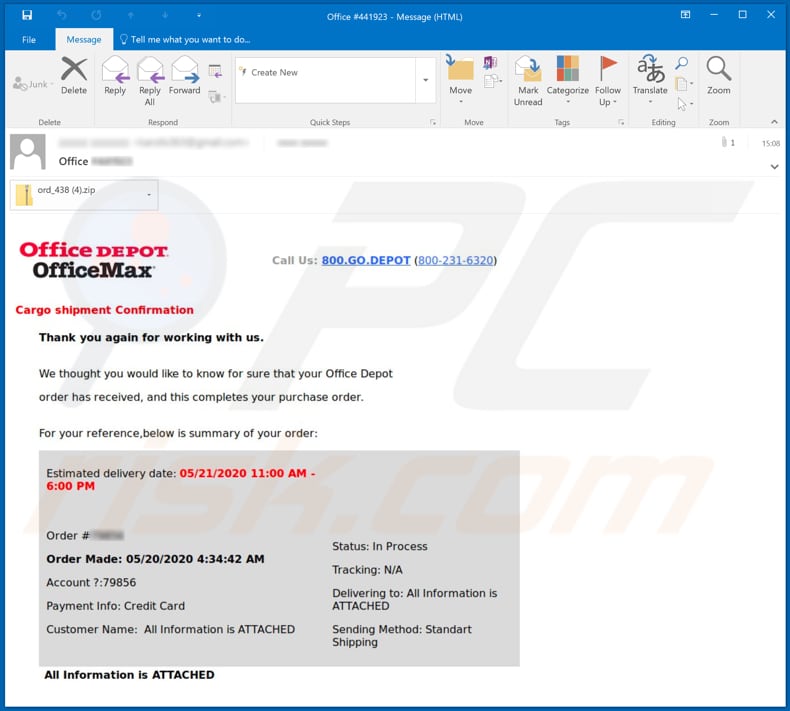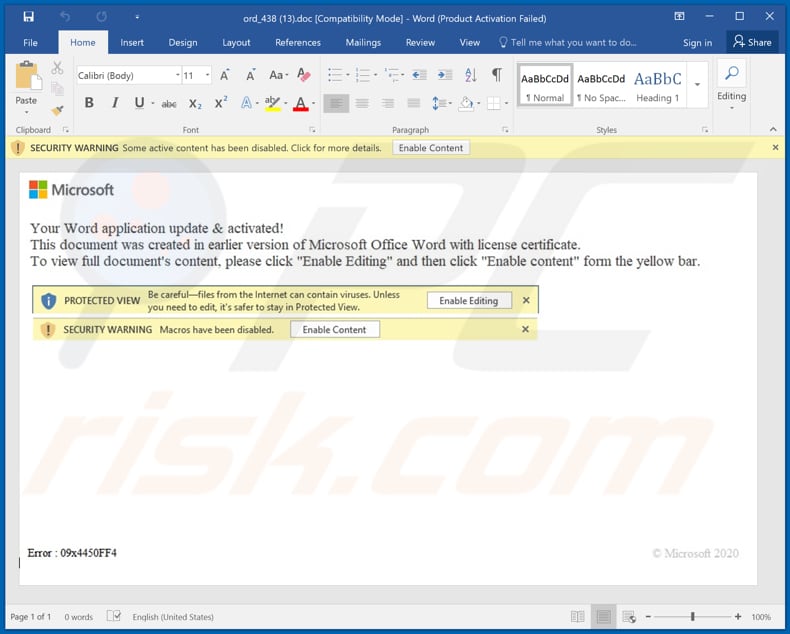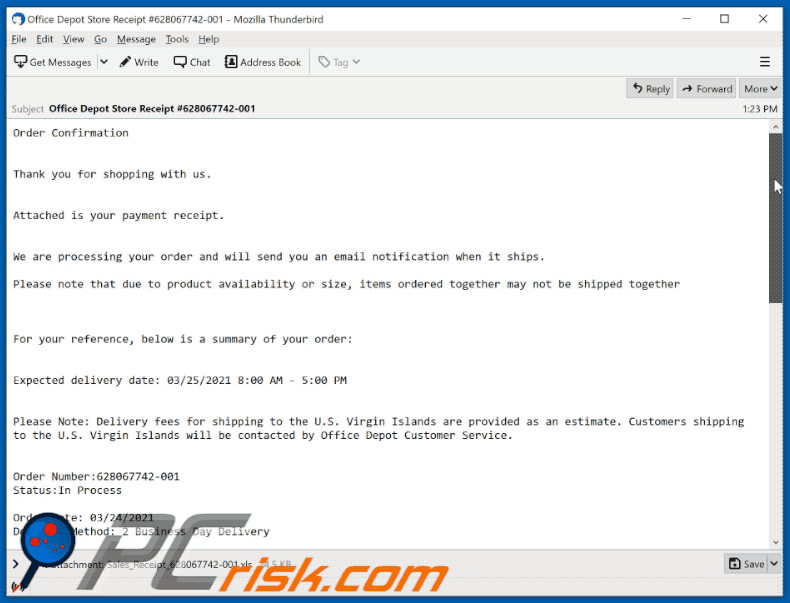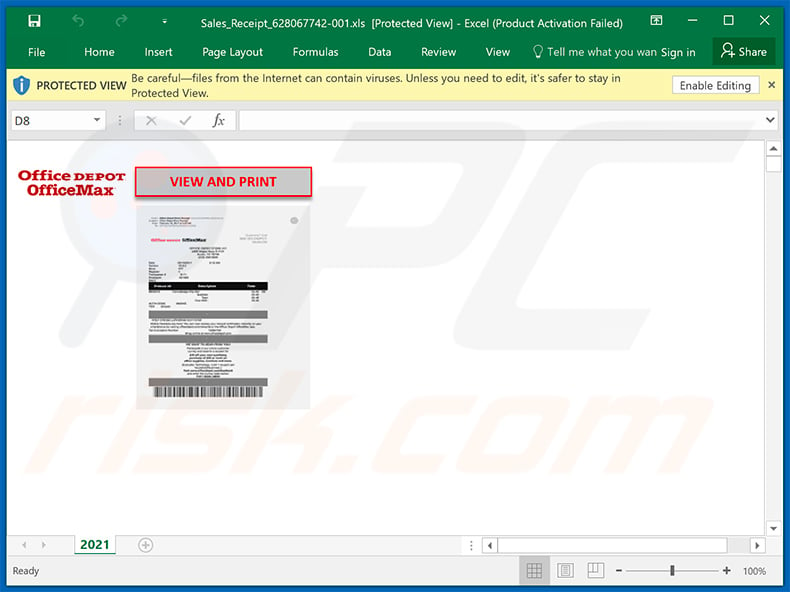How to avoid installation of Gozi through the "Office Depot" emails
Phishing/ScamAlso Known As: Office Depot spam
Get free scan and check if your device is infected.
Remove it nowTo use full-featured product, you have to purchase a license for Combo Cleaner. Seven days free trial available. Combo Cleaner is owned and operated by RCS LT, the parent company of PCRisk.com.
What is "Office Depot Email Virus"?
There are many spam campaigns that are used by cyber criminals who attempt to trick people into installing malware. They send emails that contain a malicious attachment or website link that downloads the rogue file. They attempt to trick recipients into opening the malicious file (which then installs malware) by disguising their emails as important and official.
In this case, they spread an email disguised as a message from Office Depot, a legitimate retail company. It contains an archive file containing a malicious document designed to distribute Gozi (also known as Ursnif).

This email is disguised as a message regarding shipment confirmation of a purchase order. Cyber criminals behind this email attempt to trick recipients into opening a document designed to contain more detailed information relating to the aforementioned order.
The file (a malicious Microsoft Office document) can be extracted from the attached ZIP file. When opened, it asks permission to enable editing/enable content. Allowing this malicious MS Office document to enable content/editing grants permission for it to install Gozi, Trojan-type malware that steals sensitive information.
This malicious program is capable of logging keystrokes, collecting login credentials, browsing data, system information and other data. Cyber criminals behind this malware attempt to steal information, which is used for various malicious purposes. For example, to steal identities, accounts, and credit card details.
Therefore, Gozi's victims might become victims of identity theft, lose access to personal accounts, and experience problems relating to online privacy, browsing safety, suffer monetary loss, and other serious issues. Also, stolen accounts could be used to send spam campaigns (malspam, email scams), trick other people into transferring money, and so on.
For these reasons, do not trust this email and note that it has nothing to do with Office Depot.
| Name | Office Depot spam |
| Threat Type | Trojan, password-stealing virus, banking malware, spyware. |
| Hoax | This email is disguised as a letter from Office Depot regarding a purchase order |
| Attachment(s) | ord_438 (4).zip (its name might vary). |
| Detection Names | Avast (VBA:Downloader-EUY [Trj]), BitDefender (Trojan.GenericKD.33908645), ESET-NOD32 (VBA/TrojanDownloader.Agent.MUV), Kaspersky (HEUR:Trojan-Dropper.MSOffice.SDrop.gen), Full List Of Detections (VirusTotal). |
| Symptoms | Trojans are designed to stealthily infiltrate the victim's computer and remain silent, and thus no particular symptoms are clearly visible on an infected machine. |
| Payload | Gozi |
| Distribution methods | Infected email attachments, malicious online advertisements, social engineering, software 'cracks'. |
| Damage | Stolen passwords and banking information, identity theft, the victim's computer added to a botnet. |
| Malware Removal (Windows) |
To eliminate possible malware infections, scan your computer with legitimate antivirus software. Our security researchers recommend using Combo Cleaner. Download Combo CleanerTo use full-featured product, you have to purchase a license for Combo Cleaner. 7 days free trial available. Combo Cleaner is owned and operated by RCS LT, the parent company of PCRisk.com. |
More examples of spam campaigns that are used to deceive recipients into infecting their computers with malware are "Polícia de Segurança Pública Email Virus", "U.S Department Of Labor Email Virus" and "BBVA Email Virus". All are disguised as messages regarding an important matter and are supposedly sent from a well-known, legitimate company.
In fact, when recipients open the attached/downloaded file, they cause installation of high-risk malware (e.g., ransomware, Trojan-type software).
How did "Office Depot Email Virus" infect my computer?
Computers could be infected with Gozi through this spam campaign only if recipients extract the contents of the attached ZIP file, open the extracted malicious MS Office document, and give it permission to enable editing/content.
Note that if malicious documents are opened with MS Office versions developed before 2010, malware is installed automatically (without asking to enable content/editing), since the older versions do not include "Protected View" mode.
Some examples of other files that cyber criminals attach to their emails (when they seek to trick recipients into installing malware) are JavaScript files, executable files (.exe), PDF documents.
How to avoid installation of malware
Do not open attachments or website links if their associated emails are irrelevant, sent from unknown, suspicious addresses - they might cause installation of malware or other damage. Note that cyber criminals often disguise their emails as official, important, etc. Files and programs should be downloaded only from official pages and through direct links.
Other channels such as third party downloaders (and installers), unofficial websites, Peer-to-Peer networks (torrent clients, eMule), free file hosting pages, etc., should not be trusted or used - cyber criminals commonly employ them to distribute malware.
Unofficial, fake software updating or activation tools should also be avoided - they do not update or activate software, and often install malware instead. Furthermore, it is illegal to activate licensed programs with unofficial ('cracking') tools. Additionally, you are advised to regularly scan your computer with reputable antivirus or anti-spyware software (keep this software up to date).
If you have already opened an "Office Depot Email Virus" attachment, we recommend running a scan with Combo Cleaner Antivirus for Windows to automatically eliminate infiltrated malware.
Text presented in the "Office Depot Email Virus" email message:
Subject: Office #******
Office DEPOT
OfficeMax
Call Us: 800.GO.DEPOT (800-231-6320)
Cargo shipment Confirmation
Thank you again for working with us.
We thought you would like to know for sure that your Office Depot
order has received, and this completes your purchase order.
For your reference,below is summary of your order:
Estimated delivery date: 05/21/2020 11:00 AM -
6:00 PM
Order #******
Order Made: 05/20/2020 4:34:42 AM Status: In Process
Account ?:79856 Tracking: N/A
Payment Info: Credit Card Delivering to: All Information Is ATTACHED
Customer Name: All Information is ATTACHED Sending Method: Standart Shipping
All information is ATTACHED
Malicious attachment distributed via "Office Depot Email Virus" spam campaign:

Another example of Office Depot-themed spam email used to spread Remcos RAT via attached malicious MS Excel document:

Text presented within:
Subject: Office Depot Store Receipt #628067742-001.
Order Confirmation
Thank you for shopping with us.Attached is your payment receipt.
We are processing your order and will send you an email notification when it ships.Please note that due to product availability or size, items ordered together may not be shipped together
For your reference, below is a summary of your order:
Expected delivery date: 03/25/2021 8:00 AM - 5:00 PM
Please Note: Delivery fees for shipping to the U.S. Virgin Islands are provided as an estimate. Customers shipping to the U.S. Virgin Islands will be contacted by Office Depot Customer Service.Order Number:628067742-001
Status:In ProcessOrder Date: 03/24/2021
Delivery Method: 2 Business Day Delivery
Subtotal: 176.57
Delivery Fee: 0.00Misc.: 0.00
--------------------------
Total: 176.57You can now track delivery of your order online. Enter the order number shown in this email, or go to Order Tracking at OfficeDepot.com, and log in to track delivery of your order by entering your order number in combination with either your telephone number or account number.
Normal deliveries to business addresses are made between the hours of 8:30 AM and 5:00 PM, and to residential addresses between 8:30 AM and 7:00 PM.
Got a question? We're taking care of business every day, and we are ready to help. Call Us: 800.GO.DEPOT (800-463-3768) or Text Us: 904-853-3768 or email us and one of our Customer Service Specialists will provide prompt answers to all your questions.
Office Depot has paid the CA Electronic Waste Recycling fee on your behalf for all online and telephone purchases made in or to CA.
---
This sale is subject to the terms of use that govern this website. We reserve the right to cancel or limit any order that is made contrary to any applicable offer, discount, promotion or coupon. Please be advised that prices vary based upon the order and delivery location(s) and the applicable retail store location.For compliance with select California laws and for financial reporting purposes, all sales shipped to California and Texas customers are made by eDepot, LLC, a wholly-owned subsidiary of Office Depot, Inc, and are F.O.B. destination point.
Screenshot of the attached malicious MS Excel document:

Instant automatic malware removal:
Manual threat removal might be a lengthy and complicated process that requires advanced IT skills. Combo Cleaner is a professional automatic malware removal tool that is recommended to get rid of malware. Download it by clicking the button below:
DOWNLOAD Combo CleanerBy downloading any software listed on this website you agree to our Privacy Policy and Terms of Use. To use full-featured product, you have to purchase a license for Combo Cleaner. 7 days free trial available. Combo Cleaner is owned and operated by RCS LT, the parent company of PCRisk.com.
Quick menu:
- What is Office Depot spam?
- Types of malicious emails.
- How to spot a malicious email?
- What to do if you fell for an email scam?
Types of malicious emails:
![]() Phishing Emails
Phishing Emails
Most commonly, cybercriminals use deceptive emails to trick Internet users into giving away their sensitive private information, for example, login information for various online services, email accounts, or online banking information.
Such attacks are called phishing. In a phishing attack, cybercriminals usually send an email message with some popular service logo (for example, Microsoft, DHL, Amazon, Netflix), create urgency (wrong shipping address, expired password, etc.), and place a link which they hope their potential victims will click on.
After clicking the link presented in such email message, victims are redirected to a fake website that looks identical or extremely similar to the original one. Victims are then asked to enter their password, credit card details, or some other information that gets stolen by cybercriminals.
![]() Emails with Malicious Attachments
Emails with Malicious Attachments
Another popular attack vector is email spam with malicious attachments that infect users' computers with malware. Malicious attachments usually carry trojans that are capable of stealing passwords, banking information, and other sensitive information.
In such attacks, cybercriminals' main goal is to trick their potential victims into opening an infected email attachment. To achieve this goal, email messages usually talk about recently received invoices, faxes, or voice messages.
If a potential victim falls for the lure and opens the attachment, their computers get infected, and cybercriminals can collect a lot of sensitive information.
While it's a more complicated method to steal personal information (spam filters and antivirus programs usually detect such attempts), if successful, cybercriminals can get a much wider array of data and can collect information for a long period of time.
![]() Sextortion Emails
Sextortion Emails
This is a type of phishing. In this case, users receive an email claiming that a cybercriminal could access the webcam of the potential victim and has a video recording of one's masturbation.
To get rid of the video, victims are asked to pay a ransom (usually using Bitcoin or another cryptocurrency). Nevertheless, all of these claims are false - users who receive such emails should ignore and delete them.
How to spot a malicious email?
While cyber criminals try to make their lure emails look trustworthy, here are some things that you should look for when trying to spot a phishing email:
- Check the sender's ("from") email address: Hover your mouse over the "from" address and check if it's legitimate. For example, if you received an email from Microsoft, be sure to check if the email address is @microsoft.com and not something suspicious like @m1crosoft.com, @microsfot.com, @account-security-noreply.com, etc.
- Check for generic greetings: If the greeting in the email is "Dear user", "Dear @youremail.com", "Dear valued customer", this should raise suspiciousness. Most commonly, companies call you by your name. Lack of this information could signal a phishing attempt.
- Check the links in the email: Hover your mouse over the link presented in the email, if the link that appears seems suspicious, don't click it. For example, if you received an email from Microsoft and the link in the email shows that it will go to firebasestorage.googleapis.com/v0... you shouldn't trust it. It's best not to click any links in the emails but to visit the company website that sent you the email in the first place.
- Don't blindly trust email attachments: Most commonly, legitimate companies will ask you to log in to their website and to view any documents there; if you received an email with an attachment, it's a good idea to scan it with an antivirus application. Infected email attachments are a common attack vector used by cybercriminals.
To minimise the risk of opening phishing and malicious emails we recommend using Combo Cleaner Antivirus for Windows.
Example of a spam email:

What to do if you fell for an email scam?
- If you clicked on a link in a phishing email and entered your password - be sure to change your password as soon as possible. Usually, cybercriminals collect stolen credentials and then sell them to other groups that use them for malicious purposes. If you change your password in a timely manner, there's a chance that criminals won't have enough time to do any damage.
- If you entered your credit card information - contact your bank as soon as possible and explain the situation. There's a good chance that you will need to cancel your compromised credit card and get a new one.
- If you see any signs of identity theft - you should immediately contact the Federal Trade Commission. This institution will collect information about your situation and create a personal recovery plan.
- If you opened a malicious attachment - your computer is probably infected, you should scan it with a reputable antivirus application. For this purpose, we recommend using Combo Cleaner Antivirus for Windows.
- Help other Internet users - report phishing emails to Anti-Phishing Working Group, FBI’s Internet Crime Complaint Center, National Fraud Information Center and U.S. Department of Justice.
Share:

Tomas Meskauskas
Expert security researcher, professional malware analyst
I am passionate about computer security and technology. I have an experience of over 10 years working in various companies related to computer technical issue solving and Internet security. I have been working as an author and editor for pcrisk.com since 2010. Follow me on Twitter and LinkedIn to stay informed about the latest online security threats.
PCrisk security portal is brought by a company RCS LT.
Joined forces of security researchers help educate computer users about the latest online security threats. More information about the company RCS LT.
Our malware removal guides are free. However, if you want to support us you can send us a donation.
DonatePCrisk security portal is brought by a company RCS LT.
Joined forces of security researchers help educate computer users about the latest online security threats. More information about the company RCS LT.
Our malware removal guides are free. However, if you want to support us you can send us a donation.
Donate
▼ Show Discussion